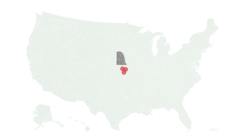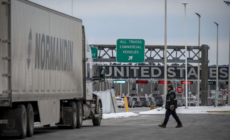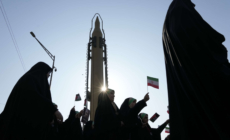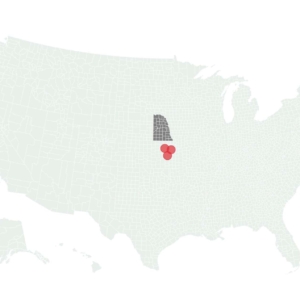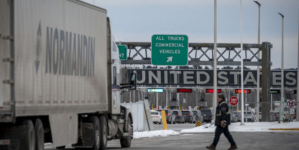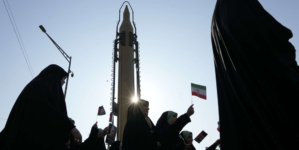-
Millions in Two States Warned To Limit Outdoor Activity - 6 mins ago
-
Red Sox vs. Rays Highlights | MLB on FOX - 14 mins ago
-
Peruvian ex-President jailed for money laundering as Brazil grants diplomatic asylum to his wife - 17 mins ago
-
US Citizen Detained After Visiting Canada: ‘Treated Like a Criminal’ - 45 mins ago
-
Orioles vs. Guardians Highlights | MLB on FOX - about 1 hour ago
-
‘Seinfeld’ star says ‘very religious’ parents ‘hated’ his work - about 1 hour ago
-
Kidnapped U.S. pastor rescued in South Africa after ‘high-intensity shootout’ - about 1 hour ago
-
US Toughens Stance on Iran, Raising Risk of War - about 1 hour ago
-
Legendary entertainer Pat Boone fears ‘terrible time of strife’ in America - 2 hours ago
-
Mets vs. Twins Highlights | MLB on FOX - 2 hours ago
Chinese warehouses are persuading Americans to buy China-made dupes to offset tariff costs
As the two largest economies in the world — the United States and China — continue to spar over tariffs, the escalating trade war is spurring some Americans to favor Chinese goods in ways they never did before.
President Donald Trump has said his sweeping tariffs around the globe are aimed at bringing manufacturing back to American shores. But as he continues to target China with his highest tariff yet, now at 145%, some Americans online say they are flocking to Chinese manufacturing rather than away from it.
“What do American companies think we’re gonna do? We’re gonna pay their prices rather than Chinese prices, when I can get a thousand times more product for the same price as we get here?” a TikTok user said in a video that got more than 16.5 million views. “We’re not gonna do that.”
Since Friday, videos on TikTok from Chinese manufacturers have drawn millions of views touting a wide variety of goods — including some making questionable claims about their roles in producing high-priced luxury items that say they’re made in Europe. Others tout dupes, or replicas, of common brand-name items that they say are of the same or similar quality.
The videos come as the United States imposes high tariffs on China and plans to close a trade loophole, called de minimis, that allows shipments under $800 to enter the country without taxes. Domestic and international discontent over Trump’s trade policy has spilled over into the internet, where artificial intelligence videos that appear to show Americans working in factories and various other memes have flourished.
Much of the content is surfacing on TikTok even as it faces an uncertain future in the United States. Having emerged as by far the most popular Chinese-owned social media app, it could be banned if its Beijing-based parent company doesn’t divest ownership by June 15.
Tony Wu, founder of the family business TLucky Sourcing, works behind the scenes with several popular Chinese factory sourcing accounts on TikTok. He said the accounts are using global social media platforms to advertise various Chinese suppliers to buyers, whether from the United States or elsewhere.
The tariffs “make some troubles, for sure, but in two or three months it’ll go back to normal, I think,” said Wu, who connects with factories to find retail and individual buyers abroad. “We will find new buyers. And [Americans] cannot replace the China factory. Finally I think they will realize that they need to buy from China. … There are no alternatives.”
Americans make up only around 5% of buyers for the factories he works with, he said, and those factories have much bigger export markets in South Asia, Africa, Europe and the Middle East. So far, Wu said, American buyers aren’t canceling orders but are instead opting for smaller orders or trying to negotiate prices.
“Honestly, America is not our main market. TikTok’s just based in America — doesn’t mean our customers are mainly from America,” he said. He said that while he believes Trump’s tariffs won’t be detrimental to Chinese exports, manufacturers are growing nervous about the sheer unpredictability of his trade policies.
Many of the videos claimed the Chinese suppliers behind popular brands sell the same or similar pieces at much cheaper prices.
“They sell you a legging pants for $100, and guess what? Here in these two factories, you can get them for around $5 to $6,” @LunaSourcingChina, an account that works with Wu’s sourcing business, said in a video that got more than 11 million views on TikTok. “And what’s even better, the material and the craftsmanship are basically the same because they all come from the same production line.”
A spokesperson for Lululemon, one of the brands mentioned in the video, said it “does not work with the manufacturers identified in the online videos and we urge consumers to be aware of potentially counterfeit products and misinformation.”
Another TikTok account that gained traction this week, @senbags2, claimed his factory has been the original equipment manufacturer, or OEM, for most of the world’s luxury bags for over 30 years. He claimed that by discreetly making bags in China before they are shipped to Europe for final touches, “the bags will appear at their boutiques as ‘made in Italy’ or ‘made in France.’”
In a video that caused heavy debate online, he claimed that a $38,000 Hermes Birkin handbag costs around $1,400 to make in a Chinese factory using the same high-quality materials. Hermes is well-known for crafting its Birkin bags exclusively in France, dedicating a single artisan to each bag.
A spokesperson for Hermes didn’t respond to a request for comment.
Even as many online remained skeptical about the claims made in the trending warehouse videos, the discourse has raised questions about the true material value of Western name-brand goods.
Chinese-made dupes of expensive luxury brands have been popular among American consumers for years — often sold by street vendors and on Chinese e-commerce sites like DHGate — but they’ve long carried a stigma of being perceived as low-quality. What the recent videos from Chinese manufacturers purport, however, is that the knockoffs are equal in everything but the value of their names.
As viral videos invited shoppers abroad to buy directly from the Chinese warehouses instead of paying top prices for Western brand logos, they generated a flurry of shock and glee among Americans who say they’re looking to purchase cheaper wholesale goods that might save them enough money to offset Trump’s tariffs on China.
In response to the tariffs, some online have been pointing out that much of Trump’s own “Make America Great Again” merchandise is made in China, as well. Others have noted that for most things Americans consume — even, for example, a Florida tangerine — moving full production processes to the United States would be highly inefficient and expensive.
Among those calling out the Chinese-made MAGA merch is a Chinese journalist who shared a video last weekend showing that inside the Trump Tower store in New York City, price tag stickers appeared to be placed in a way that covered up the “Made in China” label on several products. Though his video made waves in China, a visit to the store by NBC News didn’t find anything that appeared to be purposefully trying to obfuscate its origins.
Zhang Zhisheng, China’s consul general in Denpasar, Indonesia, also accused White House press secretary Karoline Leavitt of wearing a Chinese-made dress, writing on X: “Accusing China is business. Buying China is life.”
Many people online appear unconvinced by Chinese knockoffs of their favorite brands. But as such content circulates on Chinese and American social media platforms alike, some users, including Americans, are mocking Trump’s tariffs as fears grow about a trade war that’s potentially more disadvantageous to the United States than to China.
Source link
